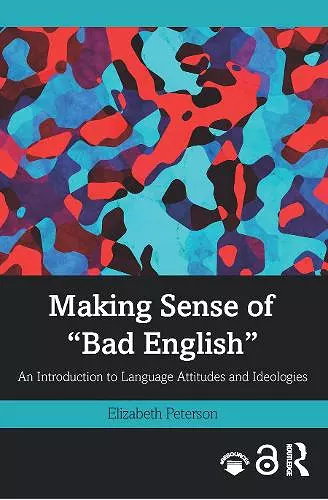Making Sense of "Bad English"
An Introduction to Language Attitudes and Ideologies
Format:Paperback
Publisher:Taylor & Francis Ltd
Published:31st Oct '19
Currently unavailable, and unfortunately no date known when it will be back
This paperback is available in another edition too:
- Hardback£145.00(9781138237469)

Why is it that some ways of using English are considered "good" and others are considered "bad"? Why are certain forms of language termed elegant, eloquent or refined, whereas others are deemed uneducated, coarse, or inappropriate? Making Sense of "Bad English" is an accessible introduction to attitudes and ideologies towards the use of English in different settings around the world. Outlining how perceptions about what constitutes "good" and "bad" English have been shaped, this book shows how these principles are based on social factors rather than linguistic issues and highlights some of the real-life consequences of these perceptions.
Features include:
- an overview of attitudes towards English and how they came about, as well as real-life consequences and benefits of using "bad" English;
- explicit links between different English language systems, including child’s English, English as a lingua franca, African American English, Singlish, and New Delhi English;
- examples taken from classic names in the field of sociolinguistics, including Labov, Trudgill, Baugh, and Lambert, as well as rising stars and more recent cutting-edge research;
- links to relevant social parallels, including cultural outputs such as holiday myths, to help readers engage in a new way with the notion of Standard English;
- supporting online material for students which features worksheets, links to audio and news files, further examples and discussion questions, and background on key issues from the book.
Making Sense of "Bad English" provides an engaging and thought-provoking overview of this topic and is essential reading for any student studying sociolinguistics within a global setting.
"Enormously fascinating to anyone with an interest in varieties of English (dialects, accents, styles) as they are spoken, natively and non-natively, around the world; and endlessly helpful in the fightback against the benighted ones who attempt to shame their fellow human beings for the way they speak."
Peter Trudgill, University of Fribourg, Switzerland
"Perceptions of "good" and "bad" English are a major issue for language users, but vary in different nation states. Such ideologies and their social consequences have been examined by sociolinguists in monolingual and to a lesser extent well-established bilingual English-speaking communities. However, the perspectives of millions of speakers and writers world-wide for whom English is a lingua franca have been largely ignored. Elizabeth Peterson’s book is therefore timely, and particularly valuable in connecting English speakers from all types of language community with the ideologies which emerge from different histories and social contexts. It will be useful both as an undergraduate teaching tool and as a resource for researchers."
Lesley Milroy, University of Michigan, USA"As the author says, the purpose of her book is not one of proselytism or conversion; rather, she has tried to make the reader think more carefully about language before labelling it ‘bad’. In using a multi-layered approach, along with an easy-to-read style, Elizabeth Peterson has easily accomplished the goal of making ‘bad English’ make sense. Ultimately, though, she leaves it to the reader to decide"
Hiram L. Smith, Journal of Multilingual and Multicultural Development, USA
ISBN: 9781138237476
Dimensions: unknown
Weight: 276g
166 pages